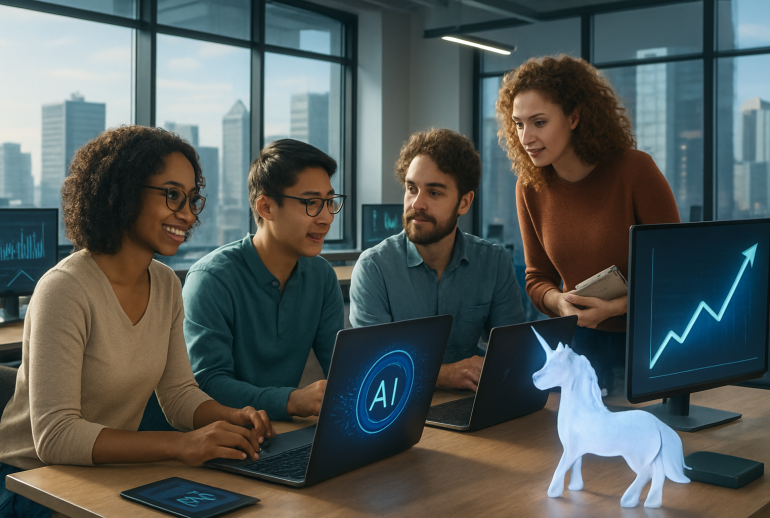In the world of startups, the concept of a “unicorn” has long symbolized the pinnacle of success—a privately held company valued at over a billion dollars. Traditionally, achieving this milestone required a large team, significant funding, and years of relentless effort. However, as we advance into 2025, the landscape is rapidly transforming. Emerging technologies, especially artificial intelligence (AI), are dismantling old barriers, empowering solopreneurs—individual entrepreneurs without large teams—to scale ventures at unprecedented rates. This shift is not merely incremental; it’s revolutionary, reshaping the startup ecosystem and challenging longstanding norms about who can build disruptive technology companies and how.
The rise of AI entrepreneurs is accelerating business growth by automating complex processes, optimizing decision-making, and enabling smart automation that was previously unimaginable for solo founders. With access to sophisticated AI agents, solo founders can now launch products faster, test multiple business hypotheses in parallel, and engage customers with personalized experiences—all while minimizing costs and operational overhead.
Venture capital firms are increasingly recognizing the potential of AI-driven solopreneurship, investing heavily in solo-led startups and fueling tech innovation. These solo ventures are transforming digital transformation strategies across industries, proving that disruptive technology does not necessarily require large organizations. Instead, a single visionary equipped with AI tools can navigate the startup ecosystem to reach unicorn status, fueling a new era of solopreneur success.
This article explores how AI is unlocking the unicorn potential for solo entrepreneurs, the practical applications enabling them to compete with traditional startups, and the broader implications on the future of entrepreneurship. Through detailed examples, analyses, and insightful perspectives, we delve into how one person, powered by AI, can now create a billion-dollar enterprise.
How AI Is Empowering Solo Entrepreneurs to Build Unicorn Startups
The remarkable advancements in artificial intelligence have democratized the startup world, providing solopreneurs with tools and capabilities once exclusive to large teams. By 2025, the integration of AI technologies within the entrepreneurial toolkit has become critical to launching and scaling startups independently.
AI entrepreneurs leverage a multitude of AI-powered tools for various business functions:
- Product development: AI coding assistants can write, test, and debug software, drastically reducing development cycles.
- Marketing automation: AI-driven platforms create targeted campaigns, manage content distribution, and analyze campaign performance.
- Customer engagement: Chatbots and personalized recommendation engines enhance user experience and retention.
- Data analytics: AI interprets vast datasets to generate actionable insights, helping solopreneurs optimize pricing, customer segmentation, and sales strategies.
- Financial forecasting: Predictive AI models help plan cash flow, investment needs, and growth strategies with improved accuracy.
These innovations enable a single entrepreneur to maintain control over critical functions without the need for extensive staff or outsourced expertise. The startup ecosystem now supports this transformation, with many accelerators and investors tailoring programs to help AI-powered solo founders thrive.
Consider Vitalii Sydorenko’s startup journey as an illustrative example. Despite operating solo, leveraging AI tools enabled him to create scalable solutions that attracted venture capital funding and accelerated his path toward unicorn status (Learn more about Vitalii Sydorenko’s journey).
| Function | AI Application | Impact on Solo Entrepreneurs |
|---|---|---|
| Product Development | AI-assisted coding and testing | Faster iteration, lower development costs |
| Marketing | Automated campaigns, content creation | Broader reach with fewer resources |
| Customer Engagement | Chatbots, personalized recommendations | Improved retention and satisfaction |
| Analytics | Data interpretation and insights | Informed decisions, strategic advantage |
| Finance | Predictive forecasting | Better cash flow management |

These capabilities culminate into an ecosystem where solo founders can compete with traditionally staffed startups, drastically reducing time-to-market and operational complexity. This evolution is fundamentally altering the way we view business growth and the kinds of entrepreneurs able to make a significant impact.
Smart Automation and AI Agents: The New Co-Founders
AI agents are more than just tools—they are revolutionary collaborators that act as virtual co-founders for solopreneurs. By 2025, these agents can autonomously run experiments, analyze data, optimize workflows, and even make strategic decisions, all with minimal human oversight.
This shift represents a seismic transformation in how businesses operate:
- Parallel experimentation: AI agents can test dozens of product variants simultaneously, accelerating innovation.
- Operational management: Automated AI systems handle logistics, customer support, and compliance, reducing the need for a large team.
- Decision-making augmentation: AI interprets complex datasets and proposes strategies to scale operations efficiently.
- Continuous optimization: AI agents learn from real-time data to improve marketing campaigns, user interfaces, and product features on the fly.
One of the fastest-growing AI startups harnessing these innovations recently secured significant funding, underscoring investor confidence in the transformative potential of AI-driven solo entrepreneurship (Explore the breakthrough startup).
| AI Agent Capability | Role in Solo Businesses | Value Delivered |
|---|---|---|
| Experimentation Frameworks | Run and analyze A/B tests | Faster innovation cycles |
| Automated Operations | Manage customer support and logistics | Reduce overhead, improve service |
| Strategic Insights | Generate growth strategies | Effective scaling, risk reduction |
| Personalization Engines | Customize user experience | Higher engagement and retention |
This confluence of AI agents and human ingenuity is setting the stage for the emergence of the one-person unicorn. Industry giants like OpenAI’s CEO have publicly highlighted this phenomenon, acknowledging the dawn of agentic entrepreneurship (Uncover insights on AI’s role in unlocking unicorn potential).
The Role of Venture Capital in the AI-Driven Solo Entrepreneur Landscape
Traditional venture capital (VC) models are evolving to accommodate the rise of AI-powered solopreneurs. In the past, VCs focused on teams and scalable human resources, but today’s investors increasingly understand the disruptive potential of smart automation and digital transformation.
VC firms are adapting their investment strategies by:
- Evaluating the technical prowess of solo founders combined with their AI proficiency.
- Assessing startups based on technological innovation and scalable AI infrastructure rather than team size.
- Providing funding tailored to AI startups’ unique growth trajectories, often focused on rapid deployment of AI models.
- Supporting ecosystem-building activities that connect solo entrepreneurs with AI research labs, incubators, and accelerators.
This paradigm shift has shortened the time from startup inception to unicorn status. For example, AI startups now reach the billion-dollar valuation in an average of 3.9 years—almost half the traditional 7-year track for conventional startups.
| VC Evaluation Criteria | Traditional Startups | AI-Powered Solo Startups |
|---|---|---|
| Team Size & Structure | Large, specialized teams | Small or solo, reliant on AI agents |
| Technology Focus | Product and market fit | AI innovation and scalability |
| Funding Use | Hiring and infrastructure | AI development and data acquisition |
| Growth Timeline | 5-7 years to unicorn | 3-4 years to unicorn |
Furthermore, major investments like the $30 billion funding round for defense startup Anduril underscore the growing investor appetite for AI-enabled innovation (Details on Anduril’s funding), highlighting how smart automation is reshaping venture capital priorities. For solo entrepreneurs, this evolving funding landscape opens unprecedented opportunities to secure critical resources without relinquishing control or diluting equity excessively.
Challenges and Ethical Considerations for AI-Powered Solopreneurs
While AI empowers solo entrepreneurs in myriad ways, this model also introduces new challenges and ethical questions. Managing rapid growth with limited human oversight requires careful balance, and the potential societal impact of widespread automation cannot be overlooked.
Some key challenges include:
- Over-reliance on AI: Dependence on AI agents can lead to blind spots where critical human judgment is needed.
- Data privacy and security: AI requires vast amounts of data, raising concerns about consumer privacy and regulatory compliance.
- Access and equity: Not all entrepreneurs have equal access to cutting-edge AI tools or venture capital, potentially widening disparities in startup success.
- Market saturation: As more solo founders leverage similar AI technologies, competition intensifies, making differentiation challenging.
On the ethical front, responsibility for AI-driven decisions rests heavily on the solopreneur, despite limited human resources. Balancing transparency, fairness, and accountability in AI applications is critical for sustainable business growth.
The case of some AI startups facing valuation struggles and investor skepticism serves as a cautionary tale of hype outpacing readiness (Learn about AI unicorn challenges).
| Challenge | Impact | Mitigation Strategies |
|---|---|---|
| AI Dependence | Potential errors unnoticed by solo founder | Regular audits and human-in-the-loop oversight |
| Privacy Concerns | Regulatory penalties, reputational damage | Implement strong data governance policies |
| Access Inequality | Reduced diversity in startup ecosystem | Promote open-source AI tools and inclusive funding |
| Market Competition | Difficulty standing out | Focus on niche innovation and customer intimacy |

Understanding and addressing these challenges is vital for long-term solopreneur success and the positive societal impact of AI-powered unicorn startups.
Future Trends: What the Next Decade Holds for Solo Unicorn Startups
Looking ahead, the rise of AI-enabled solopreneurs is poised to deepen, catalyzing a new generation of unicorn startups built by individuals. Emerging trends shaping this trajectory include:
- AI democratization: Broader access to sophisticated AI models will lower entry barriers for aspiring entrepreneurs worldwide.
- Hybrid human-AI teams: While solo founders lead, AI agents will assume more autonomous roles, functioning as critical strategic partners.
- Increased regulatory frameworks: Governments will implement clearer guidelines ensuring ethical AI use in business operations.
- Integration with emerging tech: AI-powered startups will increasingly leverage blockchain, IoT, and quantum computing for novel solutions.
- Global startup ecosystem growth: Regions beyond Silicon Valley will become hotbeds for AI solopreneurship, supported by localized venture capital networks.
Examples from Europe show new unicorns emerging despite cultural challenges like intense work schedules and bureaucracy (Explore European startup dynamics). Similarly, Indian entrepreneurs combining AI with local market insights reveal vast untapped opportunities despite setbacks (Indian startup opportunities).
| Trend | Expected Impact | Example |
|---|---|---|
| AI Democratization | More solopreneurs worldwide | Open-source AI platforms |
| Hybrid Teams | Enhanced productivity and innovation | AI agents as co-founders |
| Regulation | Ethical AI usage assurance | New compliance standards |
| Emerging Tech Integration | Novel product development | Blockchain-enabled AI apps |
| Global Ecosystem Growth | Diverse innovation hubs | European and Indian startups |
The solo unicorn movement is no longer a distant vision but an oncoming reality reshaping business growth strategies worldwide, backed by a vibrant startup ecosystem and explosive tech innovation.
Frequently Asked Questions About AI and Solo Entrepreneurs
- Q: How can AI truly replace a team for a solo entrepreneur?
AI offers smart automation and data-driven decision making that traditionally required multiple specialized staff. It acts as a virtual assistant, improving speed and efficiency. - Q: Are solo unicorn startups more likely to succeed than traditional startups?
Success depends on execution, market fit, and innovation. AI tools give solo founders competitive advantages, but many variables influence outcomes. - Q: What are the biggest risks in relying on AI for business growth?
Overdependence on AI without human oversight can lead to errors, ethical issues, and security vulnerabilities. - Q: How can a solo founder attract venture capital with minimal staff?
Demonstrating scalable AI technology, clear growth strategies, and mastery of AI entrepreneurship attracts investors focused on tech innovation. - Q: Will AI reduce job opportunities as solopreneurs take over more markets?
While AI may shift job landscapes, it will also create new roles focused on AI management, development, and ethics, evolving the workforce.


